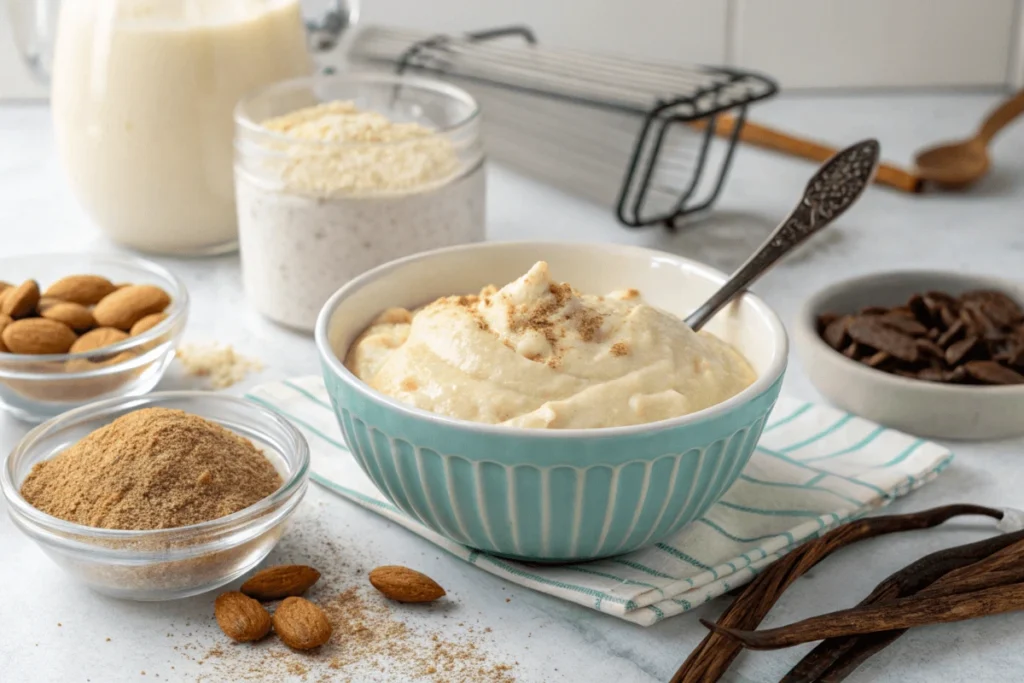Should you eat protein pudding before bed? Protein is the building block of muscles, playing a pivotal role in repair and recovery. After a hard day of training—or even just regular physical activity—your muscles crave amino acids to heal tiny tears caused by exertion. Consuming protein, especially a slow-digesting option like casein, delivers a steady stream of nutrients to fuel this repair process.
What makes nighttime unique? During sleep, your body undergoes intense repair and regeneration. By feeding your muscles protein before bed, you optimize their ability to recover, potentially waking up stronger and ready for the day ahead.
The Importance of Protein Timing in Sports Nutrition
Ever heard the phrase, “Timing is everything”? That’s especially true in sports nutrition. Eating protein before bed ensures your muscles don’t run out of amino acids while you sleep. It’s like setting up a slow-release mechanism to support muscle protein synthesis throughout the night.
Many athletes and gym-goers swear by pre-sleep snacks to maximize their recovery. Studies suggest that pairing protein consumption with your body’s natural rest cycle might give you a slight edge in muscle growth and performance.
How Sleep Enhances Protein Synthesis
Sleep isn’t just about resting your mind; it’s a powerhouse for physical repair. Deep sleep stages, particularly REM sleep, are when the body’s recovery systems kick into high gear. Feeding your body nutrients like casein protein during this critical window enhances protein synthesis, the process by which muscles rebuild and strengthen.
Interestingly, research shows that consuming protein-rich foods like pudding before bed can also help stabilize blood sugar levels, reducing nighttime hunger pangs. This ensures you stay in an anabolic (muscle-building) state, not a catabolic (muscle-breaking) one.
What Makes Protein Pudding an Ideal Pre-Bed Snack?
Nutritional Profile of Protein Pudding
Protein pudding isn’t just a delicious treat; it’s a nutritional powerhouse. Typically made with high-protein ingredients like casein, whey, or Greek yogurt, it offers a creamy texture and satisfies cravings while delivering essential nutrients. What sets it apart is its balance of slow-digesting proteins that release amino acids gradually, ensuring sustained nourishment throughout the night.
Casein, a common base for protein pudding, is especially effective. Unlike whey, which digests quickly, casein forms a gel-like consistency in the stomach, leading to slow absorption. This makes it ideal for nighttime, as your body gets a steady supply of protein for muscle repair and recovery.
Benefits of Slow-Digesting Proteins Like Casein
Slow-digesting proteins, like those found in protein pudding, have a unique advantage. While you sleep, your body goes through a fasting state, often lasting 6-8 hours. Without food, your muscles can begin to break down. But consuming casein-rich protein pudding ensures your muscles are fed during this period, keeping your body in an anabolic state.
Moreover, these proteins don’t just help muscles. They stabilize blood sugar levels, promote satiety, and even support fat loss when consumed as part of a balanced diet.
Comparing Protein Pudding with Other Pre-Bed Protein Sources
You might wonder, “Should you eat protein pudding before bed, or is there a better option?” While protein shakes and bars are popular, pudding offers unique benefits. Its thick consistency slows digestion naturally, making it more effective for nighttime recovery than faster-digesting alternatives. Plus, it’s more satisfying, curbing midnight cravings better than liquid options.
Other choices, like Greek yogurt or cottage cheese, also work well but might lack the customizable flavor and texture of pudding. When it comes to versatility and long-lasting benefits, protein pudding stands out.

Benefits of Eating Protein Pudding Before Bed
Boosting Overnight Muscle Protein Synthesis
Eating protein pudding before bed can supercharge muscle protein synthesis. As you rest, your body relies on a steady flow of amino acids to repair and rebuild tissues. By consuming slow-digesting proteins, you ensure that your muscles receive what they need to grow and recover all night long.
Research backs this up: studies suggest that nighttime protein consumption, especially casein, enhances muscle recovery after intense exercise. If gaining strength or building lean mass is your goal, protein pudding could be a game-changer.
Enhancing Recovery from Daytime Workouts
After a tough workout, your muscles need time—and the right nutrients—to bounce back. Consuming protein pudding before bed helps speed up recovery, thanks to its amino acid profile. It repairs microtears in your muscles while you sleep, reducing soreness and preparing you for your next workout.
This benefit isn’t just for athletes. Even casual gym-goers or physically active individuals can feel the difference when they fuel their bodies with protein pudding at night.
Supporting Lean Muscle Growth Over Time
Consistency is key when it comes to building lean muscle. Incorporating protein pudding into your nightly routine ensures that your body gets a regular supply of nutrients to support growth. Over time, this habit can lead to noticeable improvements in strength, endurance, and muscle tone.
Plus, it’s a sustainable way to meet your protein goals without feeling deprived. You’re not just eating a “functional” food—you’re indulging in a treat that works in your favor.
Potential Downsides of Eating Protein Before Bed
Impact on Sleep Quality and Circadian Rhythms
While protein pudding may sound like a perfect pre-bed snack, it’s important to weigh its potential drawbacks. Eating late at night, especially within an hour of bedtime, can disrupt your natural circadian rhythms. This internal clock regulates everything from hormone levels to sleep cycles, and nighttime eating may throw it off balance.
For some, consuming protein before bed could lead to slight discomfort or restlessness. It’s not the protein itself but the act of digestion, which might keep your body slightly more active when it’s supposed to be winding down. To avoid this, aim to enjoy your pudding 1-2 hours before hitting the pillow.
Risk of Overeating and Caloric Surplus
Another concern is the risk of overeating. A single serving of protein pudding is usually low in calories, but it’s easy to go overboard with extra toppings or oversized portions. If you’re not careful, those additional calories can add up, potentially leading to weight gain over time.
Moreover, consuming calories late at night can slow fat metabolism. Research shows that people who eat closer to bedtime are more likely to experience weight gain than those who finish their meals earlier in the evening.
Concerns for Those with Metabolic or Digestive Issues
For individuals with metabolic issues, like insulin resistance or diabetes, nighttime snacking might not be the best choice. Even though slow-digesting proteins have minimal impact on blood sugar, the act of eating at night can still disrupt metabolic processes.
Similarly, those with sensitive digestion might find pre-bed snacks uncomfortable. If you experience bloating or indigestion, it’s worth experimenting with different timing or smaller portions.
Who Can Benefit the Most from Protein Pudding Before Bed?
Athletes and Fitness Enthusiasts Focused on Performance
Should you eat protein pudding before bed if you’re an athlete? Absolutely. Athletes and fitness enthusiasts often have higher protein needs due to intense training sessions. Consuming a casein-rich snack before bed helps fuel overnight recovery, giving muscles the support they need to repair and grow.
This snack isn’t just for bodybuilders or professional athletes. Even casual gym-goers who want to maintain their fitness levels can benefit from incorporating protein pudding into their routine.
Individuals with High Protein Needs or Intense Workouts
People with demanding exercise routines—like marathon runners, powerlifters, or those in high-intensity sports—can benefit significantly from nighttime protein. Protein pudding acts as a convenient way to meet daily protein goals without feeling overly full or indulging in unhealthy options.
Additionally, for those in a bulking phase (trying to gain muscle mass), adding protein pudding to your nightly regimen ensures you’re optimizing your caloric and nutrient intake.
Situations Where Pre-Bed Protein May Not Be Ideal
Of course, protein pudding isn’t for everyone. If your primary goal is weight loss, it might be better to avoid eating late at night altogether. Consuming calories too close to bedtime could counteract your efforts, even if the food is high in protein.
For individuals with pre-existing health concerns, like sleep apnea or gastrointestinal conditions, late-night eating may worsen symptoms. It’s essential to consider your unique needs and consult with a health professional if in doubt.
For more delicious and nutritious recipe ideas, consider checking out our healthy snacks guide. These recipes can help you maintain balance while indulging in guilt-free treats.
Best Practices for Eating Protein Pudding Before Bed
How Much Protein Should You Consume Before Bed?
The amount of protein you consume before bed can make all the difference in achieving your fitness or recovery goals. Experts suggest that around 20-40 grams of protein is the sweet spot for most people. This range is sufficient to trigger muscle protein synthesis without overloading your digestive system.
It’s also important to tailor your intake to your activity level and goals. If you’re an athlete or someone with high protein needs, you may aim for the upper end of this range. For casual exercisers, a modest portion of protein pudding will usually suffice. Remember, more isn’t always better; balance is key.
Choosing Low-Calorie, High-Protein Options
Should you eat protein pudding before bed if you’re watching your calorie intake? The answer is yes—as long as you choose smart options. Look for recipes or brands that prioritize slow-digesting proteins like casein and avoid excessive fats or sugars.
Homemade protein puddings often offer the best control over ingredients. Using natural sweeteners like stevia and adding nutrient-dense options like almond milk or Greek yogurt keeps your pudding satisfying and healthy.
For those on stricter diets, there are many low-calorie recipes available that pack in the protein without unnecessary extras.
Timing Your Snack for Maximum Effectiveness
Timing is critical when it comes to pre-bed snacks. Ideally, you should enjoy your protein pudding 1-2 hours before sleeping. This allows your body enough time to begin digesting without disrupting your rest.
If you eat too close to bedtime, you might experience slight discomfort or restlessness as your stomach works overtime. On the other hand, eating too early might limit the overnight benefits of slow-digesting proteins. Striking the right balance ensures you get the most from this delicious and functional treat.
Protein Pudding Recipes for Bedtime Snacks
Simple Recipes for Low-Calorie Protein Pudding
One of the best things about protein pudding is how easy it is to customize. With just a few ingredients, you can whip up a snack that’s not only delicious but also packed with essential amino acids. Here’s a quick recipe:
- Ingredients: 1 scoop of casein protein powder, 1 cup unsweetened almond milk, 1 tablespoon chia seeds, and a dash of vanilla extract.
- Instructions: Mix all ingredients in a bowl and let sit in the fridge for 15-20 minutes until it thickens. Top with fresh berries for a tasty finish.
This simple recipe is perfect for satisfying cravings while keeping your calorie count low.
Creative Ingredients for Flavor and Nutrition
The beauty of protein pudding lies in its versatility. You can experiment with various ingredients to create unique flavors. Consider adding:
- Unsweetened cocoa powder for a rich chocolate flavor.
- Peanut butter for a creamy texture and extra protein.
- A sprinkle of cinnamon or nutmeg for a warm, spiced touch.
These additions not only enhance taste but also provide additional nutrients like antioxidants, healthy fats, and fiber.
Preparing Protein Pudding for Convenience and Consistency
For busy nights, preparing your protein pudding in advance is a lifesaver. Batch-making multiple servings allows you to enjoy a ready-to-go snack throughout the week. Store your pudding in airtight containers to keep it fresh and creamy.
If you’re new to this routine, start simple and refine your recipe based on your taste and goals. With time, you’ll discover your perfect mix, making the question “Should you eat protein pudding before bed?” an easy one to answer with a resounding yes.

Discover how pudding protein can transform your nightly routine in our Protein Pudding Recipe
Scientific Research on Nighttime Protein Intake
Studies Supporting Protein Before Bed for Muscle Growth
Research strongly suggests that eating slow-digesting proteins like casein before bed can enhance muscle growth and recovery. A landmark study found that consuming 40 grams of casein before sleep increased overnight muscle protein synthesis. This means your body keeps building and repairing muscle while you rest, leading to improved gains over time.
Moreover, some studies show that nighttime protein is especially beneficial after evening workouts. It gives muscles the amino acids they need to recover, potentially reducing soreness and preparing you for the next day’s activity. If you’re still wondering, “Should you eat protein pudding before bed?,” the science certainly leans toward yes for fitness enthusiasts.
Research on Protein and Sleep Quality
When it comes to sleep, the question of whether eating late affects rest often arises. Fortunately, most studies indicate that consuming a low-calorie, high-protein snack like pudding has little to no negative impact on sleep quality. In fact, some participants report fewer midnight hunger pangs and better overall rest.
The key is to avoid heavy meals or snacks high in sugar and fat, which can disrupt digestion and leave you tossing and turning. A properly portioned serving of protein pudding provides the fuel your body needs without the discomfort of a full stomach.
Insights from Nutrition and Sports Experts
Many nutritionists agree that timing your protein intake strategically can amplify its benefits. Experts often recommend slow-digesting proteins like those in pudding because they work hand-in-hand with your body’s natural overnight recovery processes. Athletes and trainers, in particular, advocate for nighttime protein as a simple way to support growth and recovery.
While opinions vary slightly depending on individual goals, the consensus remains clear: protein pudding is a powerful ally in your fitness journey, especially when consumed wisely.
Final Thoughts: Should You Include Protein Pudding in Your Routine?
Balancing Benefits and Drawbacks Based on Your Goals
So, should you eat protein pudding before bed? The answer depends on your individual needs and goals. If building muscle, enhancing recovery, or staying full overnight are priorities, protein pudding is an excellent choice. It delivers essential nutrients in a convenient, satisfying form that aligns perfectly with your body’s repair cycle during sleep.
On the flip side, if your focus is weight loss or if you have certain metabolic conditions, you may need to monitor portion sizes and overall calorie intake closely. As with any dietary choice, balance and consistency are key.
Tailoring Pre-Bed Nutrition to Your Lifestyle
What works for one person may not work for another. For example, athletes with high protein demands might benefit from nightly servings of protein pudding, while someone with a less active lifestyle might opt for smaller portions or skip nighttime snacks altogether.
Experiment with timing, ingredients, and portion sizes to find what fits your lifestyle. Keep in mind that the best dietary habits are those you can stick with for the long haul.
Making an Informed Decision for Optimal Health
In the end, protein pudding before bed is a versatile, nutritious option that can complement various health and fitness routines. Whether your goal is muscle growth, recovery, or simply enjoying a guilt-free treat, this snack offers both flavor and functionality.
If you’re still on the fence about incorporating it into your routine, start small. Try a simple recipe or ready-made option and observe how your body responds. Soon, you’ll have a clear answer to the question, “Should you eat protein pudding before bed?”


1 thought on “Should you eat protein pudding before bed?”